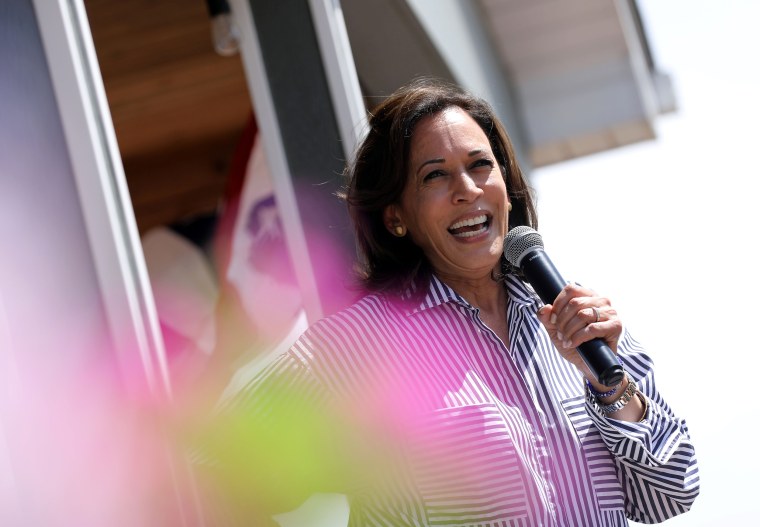The staffs of Democratic U.S. senators, who include several running for president, became slightly more diverse in 2018. Seven Democratic senators reported staffs that were comprised of 50 percent or more who identified as “non-Caucasian”.
Senate Democratic Leader Chuck Schumer’s office released new numbers, using percentages to highlight the growing diversity of Senate staff members. Raw numbers for each senator's staff were requested, but could not be provided, making it difficult to draw direct comparisons with the staffs of previous years or among the Senate staffs within any given year.
The two black U.S. senators running to represent the Democrats in next year's presidential election, Kamala Harris of California and Cory Booker of New Jersey, reported staffs that were 70 percent and 61 percent “non-Caucasian”, respectively.
Harris came in at the top of the list with the most diverse staff among Democrats in the Senate, according to the data. Seventy percent of Harris’ staff identify as “non-Caucasian”, with 33 percent who identify as Latino, 26 percent identified as black, and 12 percent identified as Asian or Pacific Islander.
Booker ranked third among Democratic senators with 61 percent of his staff identifying as “non-Caucasian”. Twenty-seven percent of his staff identified as Latino and 30 percent of his staff identified as Black.
Ahead of the 2020 presidential election and the increasing reliance of the Democratic Party on minority voters, the party has focused greater attention on diversity.
In a statement released by Schumer’s office, he said “Last November, Americans elected the most diverse Congress in the history of our country. I believe that alongside our newfound historic diversity in Congress, there must be a diverse group of staffers who work in the Congress, from staff assistants to chiefs of staff.”
Among the other Democratic presidential hopefuls, Sen. Bernie Sanders of Vermont had the least diverse staff, measured in racial and ethnic identity, with 28 percent of his staff saying they were “non-Caucasian”. Forty-eight percent of Sen. Elizabeth Warren’s staff said they were “non-Caucasian”, 46 percent of the staff for Sen. Kirsten Gillibrand of New York reported that they were “non-Caucasian”, and Sen. Amy Klobuchar of Minnesota reported 38 percent “non-Caucasians” in her staff.
These numbers, however, may be reflective of the senators’ home states. Sanders, for instance, is from a state that is almost 93 percent non-Hispanic white, according to the latest estimates from the U.S. Census Bureau’s American Community Survey, and Minnesota is 81 percent non-Hispanic white. By comparison, Sen. Elizabeth Warren’s state, Massachusetts, is 73 percent non-Hispanic white and Gillibrand’s state, New York, is 56 percent non-Hispanic white.
Harris also had the most Latinos, as a percentage, on her staff compared to her colleagues running for president, with 33 percent of her staff saying they were Latino. Booker's staff reported that 27 percent identified as Latino and 21 percent of Gillibrand’s staff did so. Among those running for president, Klobuchar reported the fewest percentage of Latinos on their staff, at four percent.
Harris also had the second highest number of staff members who identified as LGBTQ, at 19 percent. Sen. Catherine Cortez-Masto of Nevada had the highest percentage of staffers who identified as LGBTQ at 24 percent. Sen. Kyrsten Sinema of Arizona, who identifies as bi-sexual, reported 18 percent of her staff identified as LGBTQ. Every Democratic senator reported that LGBTQ members were represented in their office, with Sens. Robert Menéndez of New Jersey and Klobuchar reporting the fewest members of the LGBTQ community on their staffs at 2 percent and 4 percent, respectively.
Among the other senators running for president, Sanders came in second with 16 percent of his staff identifying as LGBTQ and Booker with 11 percent. Gillibrand’s office reported 9 percent LGBTQ and Warren’s office reported 7 percent. This year was the first year in the program that the Democratic Diversity Initiative staff survey asked for LGBTQ status.
Regarding gender, the diversity picture changes with Sanders and Gillibrand ranked the highest among their fellow candidates with 67 percent of their staff identifying as female. No data was provided for transgender respondents, specifically, except for the sexual orientation question asking if they identified with any of the LGBTQ status groups.
Most of the Democratic senators had a majority of staffers who identified as female. Among the 47 Democratic senators in the data set, 10 senators reported fewer than 50 percent of their staff as female, with Sen. Dianne Feinstein of California coming in last overall among all the Democratic senators with a staff that was 38 percent female.
Among the candidates running for president, Klobuchar was the only candidate with less than 50 percent female staff. Harris’ staff reported 63 percent were female and 59 percent of both Booker’s and Warren’s staff members said they were female.
The diversity of staff members has received greater scrutiny as Democrats represent an increasingly diverse constituency. Research suggests that diverse staffs tend to be more attentive to minority issues even in times of decline in attention around the nation.
Gender representation has been seen as a important factor in passing legislation that advanced women’s interests.
“The more our congressional staffers look, sound, and have diverse lived experiences, the stronger our democracy will be," Schumer said.


